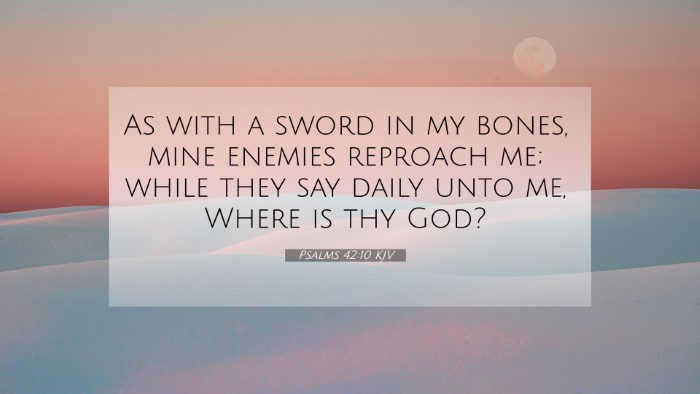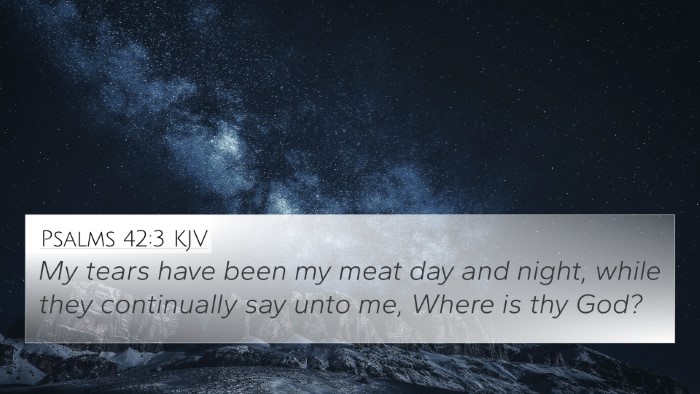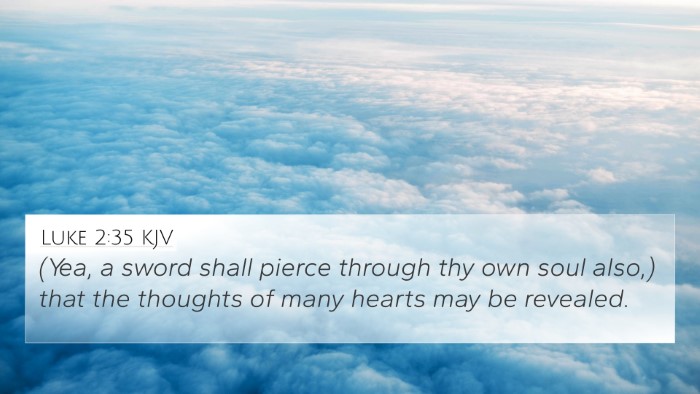Psalms 42:10 - Meaning and Interpretation
Bible Verse: Psalms 42:10
"As with a sword in my bones, my adversaries reproach me, while they say to me all day long, 'Where is your God?'
This verse encapsulates a deep sense of despair and longing for God amidst the taunts of enemies. The imagery of a sword piercing the bones signifies profound pain and distress, while the reproach from adversaries poses a theological challenge: the questioning of God's presence during suffering.
Summary of Commentary Insights
-
Matthew Henry's Commentary:
Henry emphasizes the emotional turmoil of the psalmist. The sword symbolizes acute pain, suggesting that the trials faced are not just physical but deeply emotional as well. The adversaries’ mockery raises a poignant question about faith and divine absence, highlighting the struggle between belief in God’s favor and the reality of suffering.
-
Albert Barnes' Notes:
Barnes points out that the phrase "sword in my bones" indicates a sense of deep-seated anguish that is both spiritual and psychological. He notes that the taunts of enemies serve to amplify the psalmist's feelings of abandonment, pressing the idea that during desolation, faith may feel distant, leading to introspection and a search for reassurance from God.
-
Adam Clarke's Commentary:
Clarke interprets the adversaries' challenge as a critical point for the believer, where the reality of suffering leads to questioning God's fidelity. He elaborates on the significance of public mockery in spiritual life, suggesting it prompts believers to reaffirm their faith and understanding of God’s presence in adversity.
Cross-References and Thematic Connections
Psalms 42:10 finds multiple connections across the scriptures, enhancing understanding through Bible verse cross-references. The following are key verses that relate to this passage:
- Psalms 22:1 - "My God, my God, why have you forsaken me?"
This verse expresses a similar agonizing feeling of abandonment, resonating with the despair present in Psalms 42:10.
- Job 19:14 - "My relatives have gone away; my close friends have forgotten me."
Job’s lament concerning his suffering and isolation parallels the sentiments of being reproached by adversaries.
- 2 Corinthians 12:10 - "For when I am weak, then I am strong."
A New Testament commentary on suffering; it highlights that weakness can lead to divine strength, echoing the themes of doubt and faith in Psalms 42:10.
- Romans 8:31 - "If God is for us, who can be against us?"
This verse reassures believers of God’s presence, countering the adversaries' taunts found in Psalms 42:10.
- Psalms 43:2 - "For you are the God in whom I take refuge; why have you rejected me?"
The recurring theme of feeling rejected by God when under duress links closely to the emotional plea of the psalmist in Psalms 42.
- Matthew 27:46 - "My God, my God, why have you forsaken me?"
This phrase from Jesus on the cross echoes the sentiments in Psalms 42:10, showcasing a direct connection between Old Testament anguish and New Testament fulfillment.
- Isaiah 49:14 - "But Zion said, 'The Lord has forsaken me; my Lord has forgotten me.'"
Another lament over perceived abandonment, relating to the themes of despair and the search for God's presence in difficulty.
- Psalms 10:1 - "Why, O Lord, do you stand far away? Why do you hide yourself in times of trouble?"
This verse captures the feeling of divine absence in suffering, akin to the plight presented in Psalms 42:10.
Understanding the Context
The overall context of Psalms 42 centers on a deep longing for God during times of distress. The psalmist’s cries echo the universal human experience of feeling abandoned or alone, particularly in spiritual matters. This verse acts as a poignant reminder that even the faithful may at times question God’s presence, making it a relatable exploration of faith and doubt.
Application for Believers
For modern readers, Psalms 42:10 urges a reflection on how individuals handle spiritual challenges and the mockery of those who do not understand their faith. It serves as a challenge to find strength in God despite adversities and highlights the importance of community in combating the feelings of isolation that suffering can bring.
Cross-Referencing for Deeper Study
Tools for Bible cross-referencing allow readers to explore these connections further. Engaging with a Bible concordance or utilizing a Bible reference resource can deepen comprehension and reveal additional thematic ties between scriptures.
Using a cross-reference Bible study guide, individuals can chart and explore these interconnections, fulfilling a comprehensive analysis of how verses converse across the biblical text.
Conclusion
Psalms 42:10 encapsulates the profound human experience of searching for God in times of distress. Through the insights of respected commentators and scriptural parallels, we find both solace and challenge in our faith journeys. This exploration through comparative Bible verse analysis enriches our understanding and invites us to acknowledge our questions as part of the spiritual walk.







